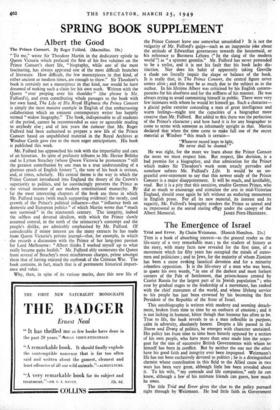SPRING BOOK SUPPLEMENT
Albert the Good
The Prince Consort. By Roger Fulford. Ms.)
" To me," wrote Sir Theodore Martin in the dedicatory epistle to Queen Victoria which prefaced the first of his five volumes on the Prince Consort's short life, " biography, while one of • the most fascinating, has always appeared one of the most difficult branches of literature. How difficult, the few masterpieces in that kind, of either ancient or modern times, are enough to show." Sir Theodore's book is certainly not a masterpiece in that kind, nor would he have dreamed of making such a claim for his own work. Written with the Queen " ever peeping over his shoulder " (the phrase is Mr. Fulford's), and even contributing whole passages to the book with her own hand, The Life of His Royal Highness the Prince Consort is simply the most massive example in English of that embarrassing collaboration which an eminent contemporary writer has happily termed " widow biography." The hook, indispensable to all students of the period, cannot be recommended as easy or agreeable reading to -anybody else ; and of late years the rumour that Mr. Roger Fulford had been authorised to prepare a new life of the Prince Consort based on unpublished material in the Royal Archives at Windsor Castle gave rise to the most eager anticipations. His book is published this week.
Mr. Fulford has approached his task with the impartiality and care of ah historian. In spite of prefatory tributes to Mr. Hector Bolitho and to Lytton Strachey (whose Queen Victoria he pronounces " still the greatest contribution by one man to a true understanding of a glorious epoch of English history "), the tone of his book is serious, and, at times, scholarly. His central theme is the way in which the Prince Consort introduced into England the theory of the Crown's superiority to politics, and he convincingly presents the Prince as
• the . virtual inventor of our modem constitutional monarchy. By far the most interesting chapters of the book are those in which Mr. Fulford traces (with much supporting evidence), the steady, cool growth of the Prince's political influence—that " influence both on domestic and European politics " of which Martin wrote that " much was surmised " in the nineteenth century. The integrity, indeed
• the selfless and devoted idealism, with which the Prince slowly assumed control, in the teeth of the aristocracy's contempt and the people's dislike, are admirably emphasised by Mr. Fulford. Of considerable if minor interest are the many extracts he has made from Queen Victoria's private journal—that, for example, in which - she records a discussion with the Prince of her long-past passion for Lord Melbourne : " Albert thinks I worked myself up to what really became quite foolish." Mr. Fulford ably exonerates the Queen from several of Strachey's most mischievous charges, prime amongst them that of having enjoyed the outbreak of the Crimean War. The book contains, in fact, much that is of permanent historical import- ance and value.
Why, then, in spite of its various merits, does this new life of
the Prince Consort leave one somewhat unsatisfied ? It is not the vulgarity of Mr. Fulford's quips—such as an inapposite joke about the attitude of Edwardian governesses towards the housemaid, or his reference to Baroness Lehzen (" In the slang of the modern world ") as " a spinster gremlin." Mr. Fulford has never pretended to be a stylist, and it is not his fault that his book lacks dis- tinction. Nor does his habit of apparently taking Greville a shade too literally impair the shape or balance of the book. It is really that, in The Prince Consort, the central figure never comes alive • and this may be as much due to the subject as to the author. In his lifetime Albert was criticised by his English contem- poraries for his aloofness and for the stiffness of his manner. He was always trying to avoid committing himself in public. There were very few intimates with whom he would let himself go. Such a character— a glacial polite exterior concealing a man of great intelligence and warm feelings—might test the capacities of , a biographer more creative than Mr. Fulford. But added to this there was the perfection of the Prince's character ; and how hard it is for any biographer to come to terms with someone as inhumanly upright as that. Martin declared that when the time came to make full use of the secret material at Windsor "this much is certain— Whatever record leaps to light, He never shall be shamed.'
He was right, for the more we learn about the Prince Consort the more we must respect him. But respect, like derision, is a bad premiss for a biographer, and that admiration for the Prince which makes Sir Theodore's work seem treacly pervades and somehow softens Mr. Fulford's Life. It would be an un- grateful over-statement to say that this newest study of the Prince Consort is a major disappointment. It will be much, and justifiably, read. But it is a pity that this sensitive, erudite German Prince, who did so much to encourage and stimulate the arts in mid-Victorian England, should once again be left without an enduring monument in English prose. For all its new material, its interest and its sagacity, Mr. Fulford's biography renders the Prince as unreal and as impersonal as the seated staring effigy under the canopy of the














































 Previous page
Previous page